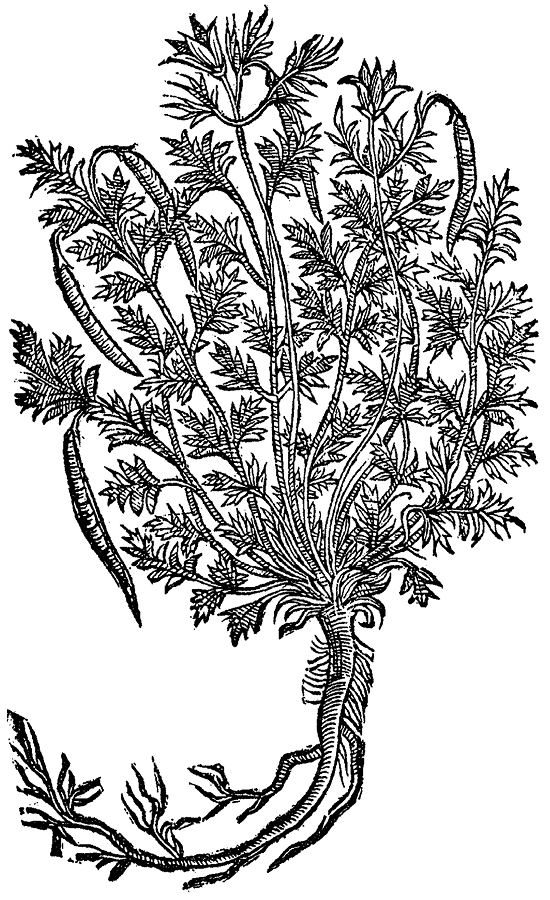
(Cuminum cyminum syn.
Cuminum odorum)
planetary ruler: Mars
element: Fire
associated deities: None
magical virtues: Love, faithfulness, fidelity
Originally cultivated in Iran and the Mediterranean region, cumin is often confused with caraway (Carum carvi), and many European languages do not differentiate between the two. It is frequently impossible to know whether cumin or caraway is referred to in older books, recipes, and folklore. Cumin is mentioned several times in the Bible, though it is sometimes mistranslated as caraway, which was unknown in the region at the time. Then again, the completely unrelated Nigella sativa seeds are sometimes called black cumin. Indeed, the seeds of caraway and cumin are quite hard to tell apart, though cumin seeds are larger, oval-shaped, and light brown in colour, with a stronger aromatic flavour than caraway.
The magical virtues of cumin are often conflated with those of caraway seeds. Like caraway, cumin is said to be detested and feared by the fairy folk of Germany, though it is likely that the association originally applied to caraway.
The Greek philosopher Socrates considered cumin beneficial as an aid to scholarly pursuits, while Pliny wrote that the smoked seeds could cultivate a scholarly pallor that just implied long hours of scholarly pursuits, and his students used it to try to make him believe that they were overworked. 75
The primary magical virtues of cumin are faithfulness and fidelity. In Egypt cumin seeds were sometimes carried in pockets by soldiers and merchants to remind them of those waiting for them back home. 76 In mediaeval Europe it was said that cumin seeds prevented lovers from straying. To ensure their men returned home, young women gave their sweethearts bread seasoned with cumin or wine with cumin, and cumin was baked into the loaves of bread sent with soldiers off to war. It often featured at weddings and was believed that a happy life awaited the bride and groom who carried cumin seeds throughout the wedding ceremony. At Hindu weddings today, cumin seeds and brown sugar are crushed together into a paste and placed in a betel leaf; as the priest recites Vedic mantras, the bride and groom in turn place the leaf on the other’s head. The mixture represents the bitterness and sweetness of life. This ceremony should also remind the couple that their relationship is unbreakable and inseparable. Cumin seeds can be baked into cakes and breads to keep a lover faithful or added to handfasting and wedding food and wine. Alternatively, just pop a few seeds in your lover’s pocket.
culinary uses
Pliny listed cumin as “the best appetizer of all condiments” 77 and in Greece and Rome, a dish of cumin seeds was placed on the table to be used much as pepper is today.
Cumin is used as a flavouring agent in cheeses, pickles, sausages, soups, stews, curries, chilli powders, stuffings, rice and bean dishes, biscuits, cakes, and liqueurs. Grind the seeds just before use and use sparingly, as the taste is strong.
cosmetic uses
Cumin is wonderful for the skin, a rich source of vitamin E, which helps the skin repair itself and fight the free radical damage that causes wrinkles, sagging, and age spots. Use a teaspoon of freshly ground seeds mixed with a tablespoon of honey as a naturally antibacterial and lightly exfoliating facial scrub. Dab Cumin Vinegar on spots and boils.
medicinal uses
actions: anodyne, antacid, anticonvulsant, antidiabetic, anti-inflammatory, antimicrobial, antioxidant, antispasmodic, astringent, bronchodilator, carminative, digestive stimulant, diuretic, emmenagogue, expectorant, galactogogue, sialagogue
The antispasmodic activity of cumin helps with minor digestive problems. The aroma, which comes from an organic compound called cuminaldehyde, activates the salivary glands, while its thymol stimulates bile secretion, so it improves digestion. Add to food or take a cup of Cumin Tea half an hour before eating.
Cumin acts as an expectorant, meaning that it loosens up the accumulated phlegm and mucus in the respiratory tracts, making it useful for coughs and colds. It is also a rich source of vitamin C and iron, both of which can help recovery, while the volatile oils present are antiviral. Take a spoonful of Cumin Electuary as required, or drink some Cumin Tea.
Caution: Cumin is a culinary herb and is generally considered safe in food amounts and nontoxic in moderate doses. Allergic reactions to the herb can occur in people who are allergic to other plants in the Apiaceae family. To be on the safe side, it should not be used in medicinal doses during pregnancy or breastfeeding. It should be avoided by those suffering from oestrogen receptor–positive tumours.

Recipes

Cumin Tea
1 teaspoon cumin seeds
250 millilitres (1 cup) water
Lightly grind the seeds and put them in a pan with the water. Bring to boil, then turn off the heat and leave to infuse for fifteen minutes. Strain and drink.
Cumin Vinegar
1 tablespoon freshly crushed cumin seeds
500 millilitres (2 cups) cider vinegar
Combine in a glass jar and leave on a sunny windowsill for three weeks, then strain into a sterilised bottle.
Cumin Electuary
3 teaspoons cumin seeds
1 450-gram jar honey
Finely powder the cumin seeds and stir into the honey. Take a teaspoonful one to four times a day.
Keeping Powder
3 teaspoons caraway seeds
3 teaspoons cumin seeds
Finely powder the seeds in a pestle and mortar while keeping your intent in mind. Sprinkle a little of this powder over things you wish to keep safe from being stolen, such as your car, bag, and so on.
Spicy Love Charm Bag
1 teaspoon cumin
½ teaspoon ginger powder
piece dried lemon peel
piece dried orange peel
½ teaspoon poppy seeds
1 vanilla pod
Sew the ingredients into a pink or red bag, and place under the bed or carry with you to improve your love life.